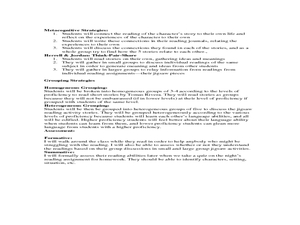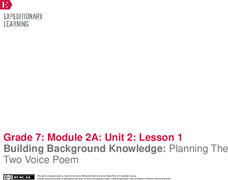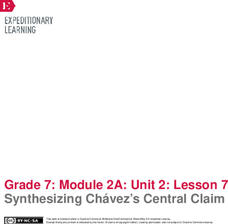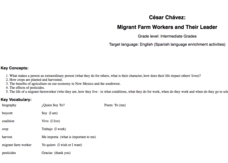Curated OER
United We Stand
Student examine the life and work of Cesar Chavez. In this Teaching Tolerance lesson, learners read about Cesar Chavez and recognize his work as a labor leader. Students discuss the concept of standing together as a group to fight...
Curated OER
Cesar Chavez Biographic Timeline
Students discuss Cesar Chavez. They watch as the teacher demonstrates making a KWL chart. Students make a chart, filling in their answers under the headings. Students watch a video about Cesar Chavez. The teacher demonstrates making a...
Curated OER
Hispanic and English Literature
Eleventh graders listen to a brief history lesson about the 40's and 50's mid-West America and the Migrant workers that worked the fields. Next, learners will read a short story written by Tomas Rivera (both in Spanish and English)....
Curated OER
Harvesting Hope--Asking for Change Letters
Second graders compose friendly letters. In this writing lesson, 2nd graders read the text Harvesting Hope: The Story of Cesar Chavez and discuss the rights of farm workers. Students brainstorm things at school they would like to change...
Curated OER
The Roots of Ahimsa
Students investigate the philosophy of nonviolence. In this Ghandi lesson, students discover that Gandhi inspired many civil rights leaders with the idea of ahimsa. Students complete venn diagrams, create timelines, and discuss...
Curated OER
Face to Face with the Great Depression
Students develop an analytical perspective of how historians record, preserve, and interpret data. In this US history lesson students read and interpret personal accounts of the Great Depression. They discuss how interpretation affects...
Curated OER
Education of the Heart
Sixth graders compare and discuss a given set of quotes by Pericles and Cesar Chavez and how they relate to a peaceful society. They respond to a variety of quotes and discuss the animal issue of animal tested cosmetics then discuss...
EngageNY
Reading Closely and Introducing Rhetoric Toolbox: Unions as Agents of Change—Part 1
Scholars explore the question of whether labor unions are the agents of change as they continue reading César Chávez's 1984 speech, "Address to the Commonwealth Club of California." They discuss rhetoric in Chávez's speech and discover...
Center for Civic Education
In the Shadows, Agents of Change
Most of your learners have probably heard of Martin Luther King, Jr., or Cesar Chavez, but could they also recognize the names of Betty Friedan or Dolores Huerta? Give your learners the opportunity to discover the many accomplishments of...
College Board
2015 AP® English Language and Composition Free-Response Questions
Many schools have honor codes, but scholars do not always choose to follow them. As part of a series of free-response questions from the AP® English Language and Composition Exam, learners discuss the benefits or disadvantages of honor...
Curated OER
Nonviolent Conflict Resolutions with Cesar Chavez
Third graders investigate nonviolent conflict resolution strategies. In this interpersonal communication lesson, 3rd graders explore conflict resolution. Students construct a newspaper/magazine article detailing nonviolent conflict...
Curated OER
How the Great Depression Affected California and C¿¿sar E. Ch¿¿vez
Fourth graders examine the effect of the Great Depression on California. After reading a summary, they discover how the depression and Dust Bowl led to the immigration of great numbers of farm workers into California. They also...
Curated OER
Cultural Connections
Students explore the concept of philanthropy. In this service learning lesson, students examine the impact of the works of Cesar Chavez, George Washington Carver, Sunderlal Buhuguna, and Abdul Sattar Edhi.
EngageNY
Building Background Knowledge: Planning The Two Voice Poem
Scholars build background knowledge to understand the life and work of the union leader and labor organizer César Chávez. As they read teacher-selected resources, they complete a Building Background Knowledge worksheet and engage in...
EngageNY
Reading Closely: Introducing Chávez’s Commonwealth Club Address and Considering the Plight of the Farmworker
How can a persuasive speech help inspire social change? Scholars read along as they listen to the first half of César Chávez's 1984 speech, "Commonwealth Club Address." Next, pupils use graphic organizers to analyze one of Chávez's...
EngageNY
Speech Structure: Unions as Agents of Change— Part 2
Scholars continue reading César Chávez's 1984 speech, "Address to the Commonwealth Club of California." Working with partners, they complete graphic organizers to determine a claim that Chávez makes about the UFW.
EngageNY
Mid-Unit Assessment: How Chávez Develops His Claims in the Commonwealth Club Address
Scholars complete a mid-unit 2 assessment, analyzing how César Chávez supports his claims in his 1984 speech, "Address to the Commonwealth Club of California." Learners focus on paragraphs 18 and 19 of the speech, answering text-based...
EngageNY
Speech Structure: Part 2 of the Commonwealth Club Address
Scholars continue reading and analyzing César Chávez's 1984 speech, "Address to the Commonwealth Club of California." Working with partners, they answer text-dependent questions about how governments and consumers affect working...
EngageNY
Synthesizing Chávez’s Central Claim
Class members play an interactive game, matching strips of paper containing rhetorical devices with examples from César Chávez use rhetoric in his 1984 speech, "Address to the Commonwealth Club of California." Next, partners discuss...
EngageNY
End of Unit Assessment: Analyzing the Structure of Chávez’s Wrath of Grapes Speech
César Chávez gave his 1986 "Wrath of Grapes" speech to educate consumers about pesticide use. Scholars complete an end of unit 2 assessment, applying what they learned throughout the unit to a new text. They then analyze the structure of...
Facing History and Ourselves
California Grape Workers’ Strike: 1965–66
The California grape workers' strike of 1965-66 is the focus of a lesson that asks high schoolers to investigate the strategies farmworkers used to organize and gain contracts with grape growers that ensured higher waters and better work...
National Woman's History Museum
Dolores Huerta and the Delano Grape Strike
Few have heard of Dolores Huerta and her part in organizing the California farm workers, establishing the United Farm Workers union and orchestrating the Delano Grape strike. High schoolers consider why this powerful woman has been...
University of New Mexico
César Chávez: Migrant Farm Workers and Their Leader
During the first week of instruction, middle schoolers research biographies on Cesar Chavez and make a pictorial collage of his life. For the second and third week, they maintain a seven-day diary of a farmworker and write a poem. For...
Curated OER
C¿¿sar Ch¿¿vez, Organizes the Farm Workers Association - Act I, Scene I "The House Meeting"
Eleventh graders analyze the development of federal civil and voting rights for minority groups. In groups, they discuss how Cesar Chavez organized the farm workers and the techniques he used when protesting. They define and practice...
Other popular searches
- Cesar Chavez Day
- Cesar Chavez Lesson Plan
- Esl Cesar Chavez
- Cesar Chavez Bio Poem
- Cesar Chavez Speeches
- Cesar Chavez Storyboard
- Labor Strikes Cesar Chavez
- Spanish Cesar Chavez
- Cesar Chavez Web Quest
- Cesar Chavez Leson Plan
- Julio Cesar Chavez
- Cesar Chavez Webquest























